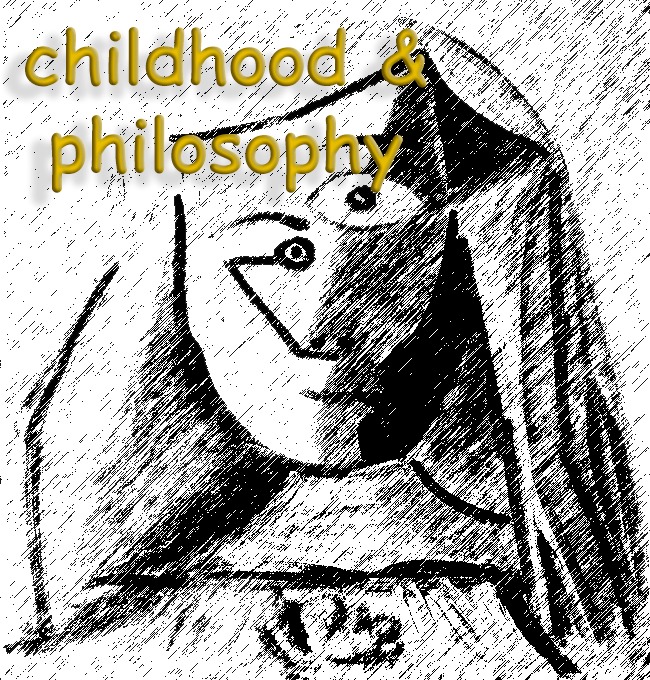the story circle as a practice of democratic, critical inquiry
DOI:
https://doi.org/10.12957/childphilo.2021.55722Keywords:
philosophy for children, community of philosophical inquiry, story circle, democracy.Abstract
The authors of this essay have been committed practitioners and teachers of Philosophy for Children in a variety of educational settings, from pre-schools through university doctoral programs and in adult community and religious education programs. The promotion of critical thinking has always been a primary goal of this movement. But communal practices of critical thinking need to include other kinds of democratic conversation that prompt us to see others as full-fledged persons and to be curious about how our being in community with them makes growth and self-correction possible. As we continue to experiment and innovate in new contexts we see ourselves continuing the inquiry around expanding the inclusivity of conversations about basic human concerns. In this essay we describe an inclusive strategy called the story circle, that was first developed as a method of popular education in Denmark and was then adapted as a tool of social change among poor and dis-empowered American citizens in Appalachia. Story circles were later utilized in a philosophical living-learning community and most recently coupled with Lipman and Sharp’s dialogue method of the community of philosophical inquiry (CPI). The authors of this paper have combined story circles with the community of philosophical inquiry in a variety of contexts. In each iteration, telling one’s own story and listening carefully to the stories of others can be equally revelatory actions.
Downloads
References
Bouchard, N. (2006) Éthique et culture religieuse à l’école. Québec, QC: Presses de l’Université du Québec.
Bouchard, N. and Daniel, M.-F., eds. (2010) Penser le dialogue en éducation éthique. Québec, QC: Presses de l’Université du Québec.
Cam, P. (1994). Dewey, Lipman, and the Tradition of Reflective Education. In Taylor, Michael et al, eds. Pragmatism, Education and Children. Amsterdam: Editions Rodopi, 1994, 163-81.
Clark, S. (1990) Ready from Within: A First Person Narrative. Trenton, NJ: Africa World Press, Inc.
Englund, L. (2005) A Living Education: An Approach for the 21st Century. PhD thesis, University of Minnesota, Minneapolis [Online]. www.tc.umn.edu/~engl8813/Living_education.pdf, accessed 25 March 2016.
Ennis, R.H. (2015). Critical thinking: A streamlined conception. In M. Davies and R. Barnett (Eds.), The Palgrave handbook of critical thinking in higher education (pp. 31-47). New York, NY: Palgrave Macmillan.
Fletcher, N. (2019) Destabilizing stereotyped concepts in childhood. Prospects: Comparative Journal of Curriculum, Learning and Assessment, 182.
Gregory, M. and Laverty, M. (Eds.) (2018) In Community of Inquiry with Ann Margaret Sharp: Philosophy, Childhood and Education. London: Routledge.
Goodwin, C. and Duranti, A. (1992) Rethinking Context: Language as an Interactive Phenomenon. Cambridge, MA: Cambridge University Press.
Horton, M. (1998) The Long Haul: An Autobiography. New York: Teachers College Press.
Horton, M., Freire, P., Bell, B., Gaventa, J. and Peters, J. (1990) We Make the Road by Walking: Conversations on Education and Social Change. Philadelphia, PA: Temple University Press.
Horton, M. and Moyers, B. (1982) The Adventures of a Radical Hillbilly: An Interview with Myles Horton. Appalachian Journal 9(4): 248-285.
James, W. (1916) Talks to Teachers on Psychology. New York: Henry Holt and Company.
Lipman, M. (1985). Philosophy for children and critical thinking. National Forum 65(1): 18 23.
Lipman, M. (1988). Critical thinking: what can it be? Educational Leadership 16(1): 38-43.
Lipman, M. (1992). Unreasonable people and inappropriate judgment. Inquiry: Critical Thinking Across the Disciplines 10(3): 18-22. doi: 10.5840/inquiryctnews199210319
Lipman, M. (1997). Thinking in community. Inquiry: Critical Thinking across the Disciplines 16(4): 6-21.
Lipman, M. (2003). Thinking in education (2nd edition). Cambridge, MA: Cambridge University Press.
Marsilli-Vargas, X. (2014). Listening genres: The emergence of relevance structures through the reception of sound. Journal of Pragmatics. (69) 42-51.
Matthews, G.B. (1980). Philosophy and the Young Child. Cambridge, MA: Harvard University Press.
Matthews, G.B. (1984). Dialogues with Children. Cambridge, MA: Harvard University Press.
Matthews, G.B. (2009). ‘Philosophy and Developmental Psychology: Outgrowing the Deficit Conception of Childhood,’ in Siegel, H. (ed.), The Oxford Handbook of Philosophy of Education, pp. 163-176. Oxford University Press.
Palmer, P. (1998) The Courage to Teach: Exploring the Inner Landscape of a Teacher’s Life. San Francisco: John Wiley and Sons.
Peirce, C.S. (1997) “The Fixation of Belief.” In Pragmatism: A Reader, edited by Louis Menand. New York: Vintage.
Shea, P. (2008) Philosophy for Children and Learning Circles: How Do We Help People to Want to Be Better? Retrieved 11 July 2017 from http://gambitsanddrafts.blogspot.com/2015/02/philosophy-for-children-and-residential.html.
Thayer-Bacon, B. J. (2000). Transforming critical thinking: Thinking constructively. New York, NY: Teachers College Press.
Wallace, J. (2002) Correction: Invitation to storytelling learning circle. Workshop announcement retrieved 8 July 2017 from http://evergreen.loyola.edu/rcrews/www/sl/archives/jan02/msg00013.html.
Wallace, J. (2004) Notes on Learning Circles. In “Learning Circles: A Train-the-Trainers Approach,” pp. 10-23, retrieved 13 June 2017 from http://bonnernetwork.pbworks.com/f/BonCurFacilLearnCircles.pdf.
Wallace, J. (2007) The Problem of Time: Enabling Students to Make Long-Term Commitments to Community-Based Learning. Michigan Journal of Community Service Learning 7: 133-142 (retrieved 13 June 2017 from http://hdl.handle.net/2027/spo.3239521.0007.115).
Young, I. (1996) Communication and the Other: Beyond Deliberative Democracy. In Democracy and Difference, edited by Seyla Benhabib. Princeton: Princeton University Press.




